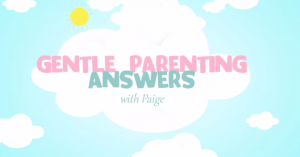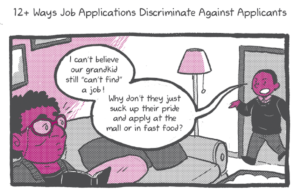
A person appears exasperated as they throw their hand up and look in disbelief at their laptop.
When you’re a human being of any combination of marginalized identities making your way through the world, a funny thing happens: People want to fight with you a lot.
And I don’t necessarily mean physical fights – although (thanks a lot, oppression!) violence inflicted against folks at the margins happens frequently – but rather, the seemingly innocuous form of fighting known as “debating.”
And I really do mean quote-unquote “debating” because it in no way, shape, or form resembles what an actual debate looks like. It’s not two or more people civilly discussing a previously proposed topic that they’ve had time to research and formulate intelligent thoughts on. It’s not two or more people disagreeing on a subject and each being given a chance to lay out the rational, emotional, and ethical appeals of their own sides. It’s not a question of who is, simply, better at preparing an argument, based on a known and agreed-upon set of rules.
Rather, it’s basically an assertion that your opinion based on your lived experience (or, hell, even academic or professional expertise) is inconsequential to a broader understanding of Reality, followed by a predictable set of invalidating behaviors that the speaker believes to be “debating skills.”
In actuality, it’s trolling. It just feels more intelligent and morally benevolent to the troll.
If you’ve ever been a marginalized person on the Internet, you may recognize this phenomenon as “The Facebook Comment Thread Effect” – and it’s the reason why so many people choose to bow out of these arguments entirely: not because they can’t defend themselves, but because they shouldn’t have to.
After all, no one had declared that at this specific time and place, a debate (an actual debate, as outlined above) would occur.
But these absurd arguments happen because there’s always at least one person who just can’t admit that they have no fucking idea what they’re talking about.
“Debating.”
Now, I find it fascinating that it’s most frequently the people with the most privilege in any given situation who want to engage in “debate” with me and others. And that’s not because I expect more of, say, straight, white, cis men – because I most certainly do not.
To the contrary, I expect this desperate attempt at domination because that’s how oppression works on an individual level: People with the most power and privilege believe their mediocre opinions to be of actual intellectual consequence, and then attempt to force their misconceptions onto everyone else to the benefit of (who else?) their damn selves.
What makes me so intrigued by it is, simply, that I have never known another group of people to be so unskilled, overall, at legitimate debating.
But I guess that’s just because they haven’t been in the position, since birth, of having their mere existence be up for debate. And I can’t fault them for that lack of opportunity. What kind of feminist would I be, then?
Instead, here, I’d like to show you the top ten most-oft attempted “debating skills” that privileged folks employ on their unsuspecting totally suspecting counterparts, what they really mean, and why they’re such bullshit.
1. ‘But Have You Ever Considered [Insert Status Quo Concept]?’
This is generally known as playing devil’s advocate, and there’s a reason why it’s the work of Satan.
Don’t get me wrong: The actual employment of devil’s advocacy in debating (where one speaks for a perspective not currently present, in an attempt to get someone else to reconsider their viewpoint) is totally respectable.
But as I wrote about in detail in this article, there are several reasons why the way that this attempt at “debate” is usually employed is both offensive and fruitless.
To start: Regurgitating the status quo is pointless. If I say that street harassment doesn’t register as a compliment, your turning around and saying “But have you ever considered that they mean it as a compliment?” has no use in the conversation.
You’ve taken the exact point that I’m making a counterargument against and just repeated it. That’s not a fascinating new angle for me to consider. I’ve already considered it.
2. ‘If I Infantilize You, Then That Makes Me Right’
Honey. Baby. Sweetheart.
If you’re not my partner or my old-school dad, I likely never want to hear these words come out of your mouth. And even if you are my partner or my dad, I still never want to hear them when we’re in a debate or an argument.
Using diminutives like this – which can include nicknames that you have no right to use – serves to do one thing: make someone feel smaller, or at least let them know that you see them as smaller from your perspective.
Amazingly, just recently, this happened on CNN when Andre Bauer referred to Angela Rye as “darlin’” in the middle of his counter to her argument about the upcoming election. Her face said it all, but she was sure to put him in his place when she responded, “‘Darlin’?’ That’s cute. […] Don’t call me ‘darlin’’ on air.”
He said to her, “I respect your opinion.”
To which she responded (to the joy of women everywhere), “You don’t. You called me ‘darlin’’ at 2:30 in the afternoon, Andre. You don’t respect my position at all.”
If you don’t have basic respect for the intelligence (and grown-up-ness) of the person you’re engaging in debate, you’re not debating.
3. ‘I AM REPEATING THE ARGUMENT I ALREADY MADE, BUT NOW IN CAPS TO MAKE IT MORE REAL’
This is the online version of “Whoever yells the loudest is the right-est.”
And if you need an explanation of why this is ridiculous, then I have very little hope for you.
But let me put it this way: The only person who I can recall ever saying that to me in earnest was my emotionally abusive ex-boyfriend.
4. ‘No, You’re Wrong’ – Followed by No Argument Whatsoever
I call this “The Trump” – named after God-awful debater Donald Trump, not the game Whist.
And that’s because, over the course of the presidential debates, when Hillary Clinton is talking, frequently, Donald Trump will lift his microphone to his lips and just say, “Wrong.” Nothing else. Just “wrong.” It’s usually followed by this awkward move where he then pivots on his heel and starts walking the other way.
Now, there are plenty of things that Hillary Clinton is wrong about, and it makes total sense that any given person would want to point those out, and then back up their claim with evidence. But not Donald Trump. He just wants her to know he thinks she’s wrong. I guess.
After the first debate, I saw a friend of a friend comment that “You can’t just shout ‘WRONG’ at your opponent and have it be accurate.” To which I responded, “Please frame this and send it to my trolls, thanks.”
Given, I may be wrong. There are plenty of times that I’m wrong, and I want to know when that happens so that I can right myself. Hell, I’ll even apologize!
But more often, people use an assertion of wrongness just because they don’t like what you’re saying. And that doesn’t, in fact, make you wrong – or make them right.
5. ‘LOL – If I Laugh at You, That Will Make You Realize That You’re Wrong’
Is anything more annoying in a contentious conversation than having someone comment with something like “Hahaha yeah okay” or “LOL you’re so ignorant, I can’t even?”
What’s worse is that they’re doing it to be annoying – so then you end up even more frustrated with yourself for falling for it. I hate that shit.
But what I really hate even more is that that person leaves the comment thread thinking that they “won” the “debate.”
You can leave any conversation you want to, and you don’t owe it to anyone to engage with them, necessarily. But you don’t get to feel smug afterward.
6. ‘If I Stereotype You, Then That Helps Me Make a Really Good Point’
Recently, someone that I know posted about whether or not Black Lives Matter protestors should be arrested if and when they block traffic on highways. It was one of those posts that I told myself not to read through, but ended up doing so anyway.
And of course, there were folks talking about more “appropriate” ways to protest that are less “disruptive” (um, civil unrest is supposed to be disruptive, y’all).
I didn’t want to get into a huge argument with any one person on the thread, but because the original poster was a former student of mine, I wanted to throw in my two cents – which I did, pointing out some of the nuances of oppression.
To which, one of the #AllLivesMatter folks directly replied, “LOL. All I had to do was look at your profile picture, and I knew you were going to yell at me.”
First of all, he did the “LOL” thing, which (see #5) I already hate. But then he tried to make a smarmy remark about my appearance and the stereotypes that he associates with it – as if that’s an actual argument.
Okay. I get it. I “look like” a “social justice warrior” – whatever the fuck that means. But do you really think that pointing that out makes for a brilliant point? That’s not debating. That’s just trying to annoy me. And it does annoy me – but not even for the reason that you think.
Of course, being called out for “looking like a feminist” (in case you didn’t get the memo, we apparently all wear glasses and red lipstick, so get on that shit) is a relatively harmless stereotype. But if and when, in a person’s mind, stereotypes are fair game, that can get really oppressive really quickly.
7. ‘You’re Too Emotional to Discuss This Rationally (Even Though I’m the One Screaming and Name-Calling)’
Ah, yes. The myth of objectivity. My favorite thing to go to battle against.
The argument goes like this: “Because I’m so far removed from the situation at hand, I’m in a better position to judge it rationally, as my emotions don’t run high around it.” It’s: “I can see this more clearly than you can because your understanding is fogged by subjectivity.”
The problem is that this doesn’t actually make any fucking sense. If I say that two-plus-two equals four calmly, I’m not any more right than I would be if I said it while crying.
Further, if any given topic of conversation is something that I experience day in and day out as a marginalized person, how does that make you the expert, exactly?
It doesn’t. Next.
8. ‘I Learned the Word Bias in a Class Once, So I Know You Have It (But Don’t Realize I Do, Too)’
This ties right into the last point. Twitter eggs will frequently ask me, thinking they hit the jackpot, “You don’t think you have a bias?”
Of course I have a bias. Because every single person in every single situation brings values and worldviews to the table. It’s literally impossible not to.
That’s why, as a researcher working on my dissertation for my doctorate, I have pages upon pages upon pages dedicated to naming my positionality, biases, and limitations, considering the place from which I’m coming to the work.
A good researcher lays bare their biases for their audience to investigate. A good researcher says, “Here’s the angle that I came from when I came to these conclusions. And here’s how I tried to mitigate those biases.”
It doesn’t actually make you smarter or more qualified when you pretend that you don’t hold biases yourself. It actually, scientifically speaking, makes your argument less valid.
9. ‘Oh, You Think You’re So Smart? What Are Your Credentials?’
I’m not a proponent of using your socially sanctioned credentials as a way to leverage your expertise in an argument. And that’s because most of those credentials – work experience, academic accolades, and so on – come from a certain amount of privilege.
As such, someone even asking for your credentials beyond your own experience as a marginalized person is oppressive.
What’s amazing, though, is that even if and when you name your professional and academic credentials, these people will still tell you that they know better than you do. Because they honestly think that their existence in the world somehow trumps yours.
If anything, your experiences in the world bring you to the table as equals. The thing is, though, usually people of privilege want to debate experiences that they’ve never actually had.
10. ‘Typical Feminist – Can’t Even Handle a Healthy, Rational, Totally-Not-Annoying-at-All Debate’
Hint: When they say this, it’s because they honestly have nothing left. You automatically win.
***
So, listen. I know that when the folks that you know start busting out these tactics, they annoy the shit out of you. And I know that that then reads to them as their “winning” their “debate” with you because you don’t have a response. But the truth is that you can’t have a response to these behaviors – because they’re not legitimate forms of debate.
So the next time someone starts with you with this nonsense, just throw this article at them and get the hell out of the thread. You deserve to save your energy.
Oh, and Twitter? (cracks knuckles) Come at me, bro.
[do_widget id=’text-101′]
Melissa A. Fabello, Managing Editor of Everyday Feminism, is a body acceptance activist and sexuality scholar living in Philadelphia. She enjoys rainy days, tattoos, yin yoga, and Jurassic Park. She holds a B.S. in English Education from Boston University and an M.Ed. in Human Sexuality from Widener University. She is currently working on her PhD. She can be reached on Twitter @fyeahmfabello.
Search our 3000+ articles!
Read our articles about:
Our online racial justice training
Used by hundreds of universities, non-profits, and businesses.
Click to learn more




















